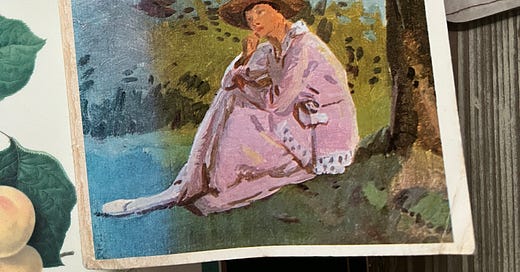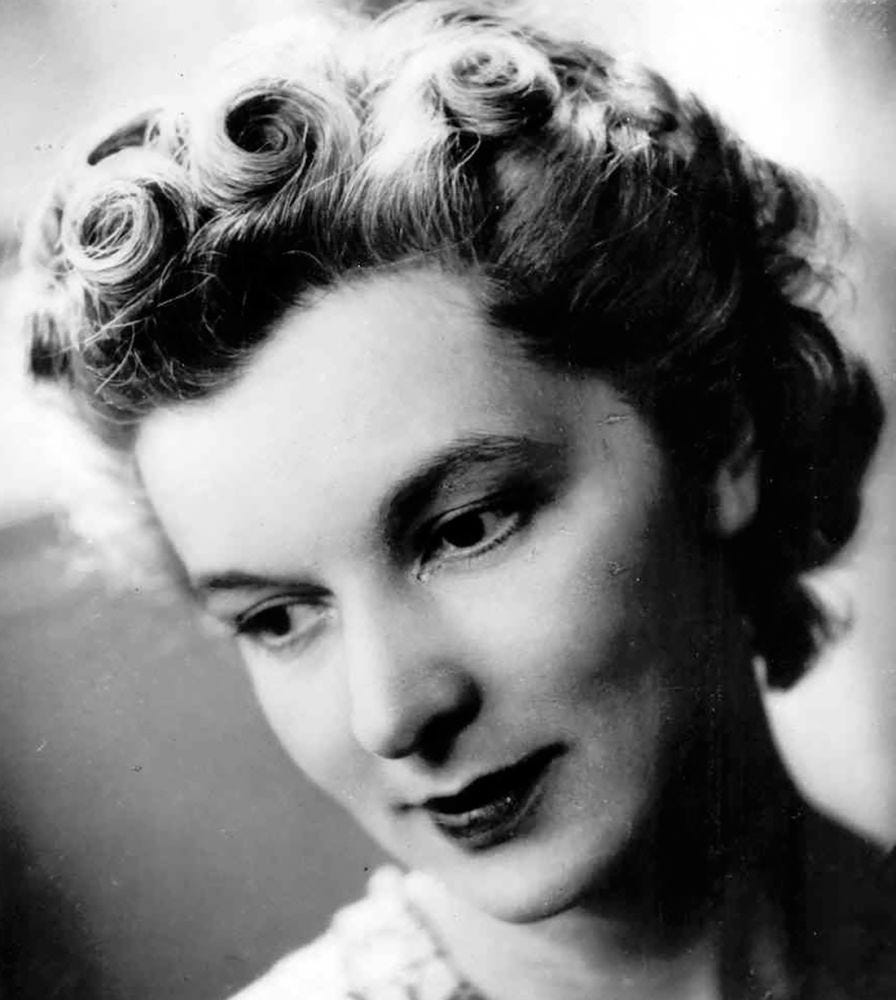Rosamond Lehmann’s Dusty Answer (1927)
It had all been experience, and that was a salutary thing
Late in Rosamond Lehmann’s first novel Dusty Answer, Julian writes to the protagonist Judith from Russia, where he is living. He encloses another letter from his cousin Mariella, written to him, and in his final words to Judith, he instructs her:
After you have read [Mariella’s letter] destroy it. You are discreet; and for some reason you care what becomes of us; and, last but not least, you have the artistic conscience, a sense of dramatic values. It seems to me this rounds us off nicely.
Tchehov? Turgenev?1
What is being ‘rounded off’ here is youth, and Julian’s allusions are poignant and apt, for although in some ways Dusty Answer is a very English novel, it’s not an emotionally restrained one in the English manner, and everything that has passed between Judith, Julian, Mariella and others is, indeed, ‘Russian’ in ways that anglophone readers understand from the stories and plays of Chekhov and Turgenev.
Each of the main characters has fallen wildly and hopelessly in love with the wrong person. Now, a more sober period of life must begin. Turgenev’s febrile month in the country is over, Chekhov’s beguiling soldiers have left the three sisters’ town. Lehmann even concludes the novel with a direct reference to Chekhov’s The Cherry Orchard (1904), that play about old ways of living being supplanted by new, in which an estate is sold, and which climaxes with the sound of an axe thudding upon the trunks of the cherished cherry trees. After Judith bids a ‘Farewell to Cambridge’ – where at Girton she fell wildly, hopelessly in love – she returns to her childhood home to ‘find that the cherry tree in the garden had been cut down,’ and that the house next door is for sale.
As a child, Judith is attracted to the summer visitors to that house next door, the Fyfes: the brothers Julian and Charlie, and their cousins Mariella, Martin and Roddy. Hers is a gorgeous story about that lovely and embarrassing time between childhood and adulthood proper, and she is the quintessence of lovely and embarrassing youth: earnest, eager, insecure, passionate, articulate, hopeful, pretentious, naïve, kind, promising, defensive, selfish, vulnerable. The Fyfes capture her imagination – in fact, they exist more in her imagination than her reality. Her fear that when she is with them they do not notice her is terrible:
Tonight when she was in bed they would all come before her, haunting and tormenting, trebly indifferent and unpossessed now that this longed-for meeting was accomplished, a bitter and fruitless fact. Imagination at least had been fecund, it had fed itself: – but the reality was as sterile as stone. What might she have done, she wondered, that she had not done, how should she have looked in order to please them?
She falls deeply in love with Roddy. He is in a relationship with a man. At Cambridge, she falls for Jennifer. Jennifer meets another woman. Martin loves Judith to distraction. Mariella marries her cousin Charlie but confesses in her letter that she loves Roddy. The lessons of the misplaced love of our salad days are tough: we can never truly know each other; dependence on other people is ‘futile’. The novel’s title is from the last sonnet of George Meredith’s sonnet sequence Modern Love: the soul ‘hot for certainties in this our life’ gets a ‘dusty answer.’
I loved all this – all the messy melodrama of it.
And the gayness! There’s no need to give Dusty Answer a queer reading Eve Kosofsky Sedgwick-style – no need to mine the text for buried layers that destabilise some heteronormative monolith – because it’s a story of the 1920s about the 1920s, peopled by deep-feeling ‘sensation-hunters’ with a natural bohemianism. Women love women and men love men.
The sequence at women-only Girton, in which Judith gets caught up in a painful love triangle, is remarkable for its rawness and frankness. (Radclyffe Hall’s The Well of Loneliness was published a year after Dusty Answer, in 1928.) The male homosexuality is more ambiguous, but only because we comprehend that Roddy is in a relationship with a man called Tony at the same time as Judith – that is, as she comprehends that Tony is an obstacle to her happiness. Tony is at first signified as gay in ways that now seem stereotypical, but the troubling (to Judith) robustness of his and Roddy’s relationship is teased out very subtly: Judith sees them together from a teashop window, or notices an envelope addressed to ‘Anthony’ in Roddy’s ‘delicate and graceful handwriting.’ And note Lehmann’s fascinating positioning of that old, complex, ever-shifting word ‘queer’ (she uses it a lot). Today the word is such a catch-all that it’s increasingly meaningless – increasingly not queer at all - but here ‘queer’ is thrillingly queer:
Tony Baring sat opposite and stared with liquid expressive blue eyes. He had a sensitive face, changing all the time, a wide mouth with beautiful sensuous lips, thick black hair and a broad white forehead with the eyebrows meeting above the nose, strongly marked and mobile. When he spoke he moved them, singly or together. His voice was soft and precious, and he had a slight lisp. He looked like a young poet. Suddenly she noticed his hands, – thin, unmasculine hands, – queer hands – making nervous appealing ineffectual gestures that contradicted the nobility of his head. She heard him call Roddy ‘my dear’; and once ‘darling’; and had a passing shock. […] Something licked sickeningly at her heart: it was necessary to be jealous of the young poet Tony; for he was jealous of her.
The characters’ unconcealed live-and-let-live nonconformism is in part a response to the horrific losses of the Great War; we are told on the first page that Charlie is killed, and there’s the steady sense throughout that this changed everything. But it’s not a particularly political novel, and in the end, Lehmann’s allusion to The Cherry Orchard seems misguided as she is not really concerned with shifting social change as Chekhov is in his great play; and the well-to-do social milieu – Lehmann’s own – is undisturbed by anyone from a lower class, let alone a coming revolution.
Probably the work Dusty Answer most closely resembles is Turgenev’s First Love (1860), an autobiographical story about youthful infatuation and all its attendant joys and woes. There’s a sly narratorial trick in which the narrative voice shifts from telling Judith’s story to addressing Judith:
Sometimes Judith thought Mariella despised her.
But she was kind too: she made funny jokes to cheer you up after tears.2
Judith’s youthful joys and woes, then, are told by a voice we could read as Judith’s own, or as Lehmann’s – the older and wiser woman addressing a younger version of herself. This lends the book a bracing honesty; it has the feel of a memoir. I loved that although Judith is a victim of cruelty, she can be cruel herself – Lehmann risks the reader disliking her, and by taking the risk, we like her all the more. As a story about growing up, it’s unsparing and sincere. First love is beautiful and mortifying. I found it recognisable and very moving.
Rosamond Lehmann, Dusty Answer (London: Chatto & Windus, 1927; repr. Harmondsworth: Penguin, 1982), p. 292. The subtitle quotation is from p. 231. Subsequent quotations are from pp. iii, 10, 60, 95-6, 101, 217, 246, 292, 302-3.
My emphasis.






Thank you for this. When I was in my twenties I devoured all the Rosamund Lehmann novels, starting with Invitation to the Waltz. Particularly The Echoing Grove. I'm wondering how well they will read today? You've made me want to dust them off!